Have you been avoiding egg yolks, butter, & red meat like the plague? It’s been drilled into our heads for decades now that saturated fat & dietary cholesterol cause heart disease and that we should all be on low-fat diets. Not only is this not true, it’s dangerous advice. Fats and cholesterol are vital to our health. In fact, our bodies make their own cholesterol if we don’t consume enough in our diet because that’s how important it is. And, the dietary cholesterol that we eat doesn’t have much of an effect on serum (blood) cholesterol.
Cholesterol is Your Friend
Cholesterol is your friend?! What?! Yes, that’s what I said. Cholesterol is absolutely essential for life- not the big bad evil it’s made out to be. Our cell walls are made of saturated fat and cholesterol- this is what keeps them firm. Cholesterol and saturated fats help our cells to communicate with each other and transport molecules in and out of the cell. 25% of the total cholesterol in our bodies is used by our brain. Cholesterol helps us to form memories. Eating a diet high in cholesterol-rich foods has been shown to improve memory in elderly people. Cholesterol is also necessary for making bile, which helps us digest fats. It’s also a pre-cursor to Vitamin D and the steroid hormones: cortisol, aldosterone, progesterone, estrogen, and testosterone.
Myelin is a fatty substance found in great quantity in our brain and nervous system. Myelin provides insulation, nourishment, and protection for all the cells in our brain and nervous system. When people start losing their myelin, they develop Multiple Sclerosis. And guess what? Myelin is made from cholesterol. People with MS should be sure to eat foods high in cholesterol and animal fat to help them heal. While we’re on that subject, cholesterol is a very healing nutrient. The reason we see cholesterol build-up in the arteries of people with heart disease is because cholesterol is going to the site of inflammation to repair the damage! Blaming heart disease on cholesterol is like seeing a fire truck at a house fire and blaming the fire on the fire truck.
Cholesterol is necessary for our immune system to function properly. LDL (low-density lipoprotein) cholesterol, known as the “bad” cholesterol, stops bacterial invaders from doing damage in the body. Cholesterol goes to the sites of damage in the body and repairs them. So, when a person has high cholesterol levels it means the body is dealing with damage and doing its job to heal. When a person has chronic inflammation, they than will have chronic high cholesterol levels, and are at risk for heart disease. It is wrong to blame heart disease on cholesterol when the cholesterol is there trying to repair the damage from the inflammation- which is the real problem. It should be noted that cholesterol levels above 300 are cause for concern and care should be taken to bring those levels down, naturally.
How the Low-Fat Diet Advice Began
So now you’re probably wondering why we’re told to avoid saturated fats and cholesterol if they’re not really the cause of heart disease. Well, it all began with the Diet-Heart Hypothesis suggested by Ancel Keys in 1953. His theory was that dietary fat & cholesterol cause heart disease and should be avoided. His theory, however, has never actually been scientifically proven. The low-fat diet trend took off, and is still recommended by doctors and government today, yet it was based off flawed science. In order to “prove” his theory, Ancel Keys made a chart displaying the correlation between fat intake and death from heart disease using data from 6 of the 22 countries that he had data for. His chart showed a direct correlation between increased fat consumption and increased risk of death from heart disease. But when the remaining countries were added into the chart it showed no correlation between fat consumption and risk of death from heart disease. At the time, the heart disease epidemic was a big issue and government officials were desperate to give an answer to the public as to why so many people were getting heart disease. They jumped on the Diet-Heart Hypothesis bandwagon and gave money to scientists so they could “prove” the Diet-Heart Hypothesis.
They picked and chose their data based on what fit with their theory and ignored the data that didn’t jive with the Diet-Heart Hypothesis. At the same time, there was a lot of good science going on as well. There were honest scientists who criticized the Diet-Heart Hypothesis, but they were ignored. When the Framingham study (which was meant to “prove” the Diet-Heart Hypothesis) was completed, the director was quoted as saying, “In Framingham the more saturated fat one ate, the more cholesterol one ate, the more calories one ate, the lower the person’s serum cholesterol…We found that the people who ate the most cholesterol, ate the most saturated fat, ate the most calories, weighed the least and were the most physically active.” So basically the complete opposite of what we’ve been told.
The food industry also loved the Diet-Heart Hypothesis and started marketing their products as “low-fat” and “heart-healthy.” Since the low-fat diet took off, heart disease rates & obesity have skyrocketed- so clearly fat & cholesterol were not the problem. When the saturated fat was removed from foods, it was replaced with massive amounts of sugar and hydrogenated fats. To this day the government is still recommending a low-fat diet because they don’t want to admit that they were wrong, and that they’ve been wrong for over 50 years.
If Cholesterol Isn’t the Culprit, What is?
The real cause of heart disease is atherosclerosis- not saturated fat & cholesterol. Atherosclerosis is the formation of lesions (called atherosclerotic plaques) that don’t heal, inside the walls of our blood vessels. This is caused by chronic inflammation. Inflammation itself is not harmful- it’s actually part of the normal healing process. Our body needs to inflame before it anti-inflames. However, when the inflammation is chronic, our arteries can become clogged and we can develop heart disease.
How to Prevent Chronic Inflammation
So instead of avoiding foods rich in saturated fat & cholesterol that are vital to our health, we want to avoid toxins that cause inflammation. These toxins would be man-made chemicals such as beauty care products, cosmetics, skincare products, perfume, toothpaste, household & industrial cleaners, laundry detergent, dish detergent, prescription and over the counter drugs, cigarettes, pollution, pesticides, chlorine, fluoride, and processed foods. All of these along with infectious microbes, gut dysbiosis, nutritional deficiencies, lack of sun exposure, lack of exercise, stress, and radiation can lead to atherosclerosis.
The major cause of atherosclerosis and chronic inflammation is Metabolic Syndrome, which comes from eating refined carbohydrates such as breads, pasta, crackers, cereal, cake, pastries, etc. Eating these foods causes the blood to be filled with massive amounts of glucose (sugar) that our bodies are not designed to handle. The pancreas releases insulin to get the glucose out of the blood and into the cells. The cells can only handle so much glucose and become insulin-resistant as to not let anymore glucose enter the cell. In response, the pancreas pumps out even more insulin to get the glucose out of the blood and the cells become more insulin-resistant. The extra glucose is converted into fat for storage. This is a very dangerous situation. Our blood sugar needs to remain at a certain level and stay stable or it can lead to a host of health issues and death. A person with Metabolic Syndrome, who has chronic high levels of insulin in the blood, will not be able to lose weight. This is because insulin is our fat storage hormone, and when it is constantly in the bloodstream we store almost all of our food as fat. A more severe symptom of Metabolic Syndrome & hyperinsulinemia (high levels of insulin in the blood) is chronic inflammation. This not only leads to atherosclerosis but also many other diseases such as cancer, Alzheimer’s disease, rheumatoid arthritis, multiple sclerosis, inflammatory bowel disease, etc. It also leads to hormone imbalances which can cause PMS, thyroid issues, mood swings, depression, infertility, poor immune function, trouble sleeping, and abnormal body shape.
There’s so much more that can be said about the importance of blood sugar and dangers of having high levels of glucose and insulin in the blood, but I’ll save that for another day before this post turns into a textbook 😉 . The bottom line: avoid refined carbohydrates & added sugars to avoid heart disease, diabetes, Metabolic Syndrome, obesity, Alzheimer’s, cancer, etc. If you want to prevent chronic inflammation (of course you do!) than you should be avoiding processed foods & sugar at all costs and limiting your exposure to toxins as much as possible. You’ll also want to avoid trans fats (hydrogenated or partially hydrogenated fats) like the plague- these are man-made fats (margarine, shortening, processed foods, bakery items) that contribute to chronic inflammation and heart disease. Stay away from iodized table salt and choose natural sea salt instead. Avoid soy- it has estrogen-like properties and can affect thyroid function. You’ll especially want to stay away from soy protein isolate (found in many, many products in America), which is washed with acid inside of aluminum containers. The aluminum remains in the soy- and aluminum is a contributor to Alzheimer’s disease. As a rule of thumb, if it comes from nature eat it, if it was made in a factory- don’t. Eat real foods that have always been food, and include some organ meats too!
Foods Rich in Cholesterol (aka healing foods)
- Caviar
- Cod Liver Oil
- Egg Yolks
- Butter
- Shellfish
- Salmon
- Sardines
- Mackerel
- Shrimp
- Animal Fat
Sources:
Put Your Heart in Your Mouth by Dr. Natasha Campbell-McBride, MD
Types of Dietary Fat and Risk of Coronary Heart Disease: A Critical Review
Was this information useful to you? Let me know in the comments!
See also:
Fat Does NOT Make You Fat
Don’t Throw Away Those Yolks!
What’s the Deal with Omega 3?
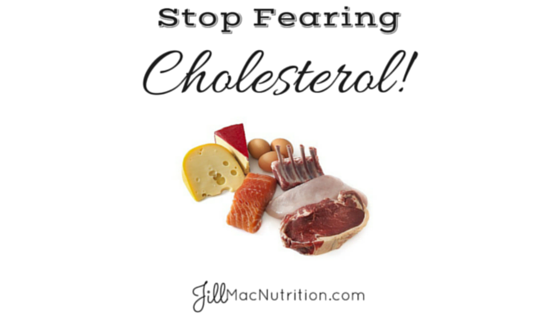


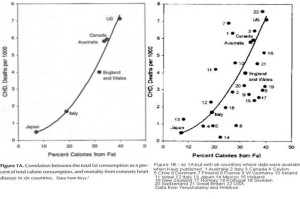
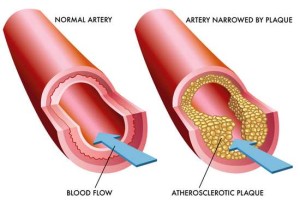



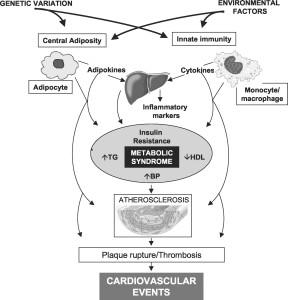
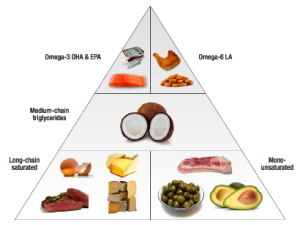
8 comments